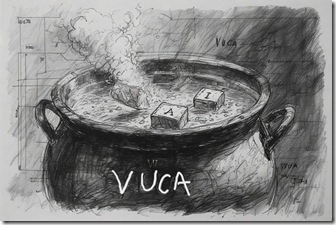Many of you would be familiar with the expression “eat your own dog food”. Eating your own dog food or “dogfooding” is the practice of using one’s own products or services. Dogfooding is not exactly new. Here are some examples:
- In February 1980, Mike Scott, president of Apple issued a memo announcing “Effective Immediately!! No more typewriters are to be purchased, leased etc., etc. … We believe the typewriter is obsolete. Let’s prove it inside before we try and convince our customers.”
- In the mid-1990s, Microsoft’s internal email system was initially developed around Unix. When asked why, they publicly moved to using Microsoft Exchange and Windows; the product benefited significantly in terms of features and quality
- In October 2016, Oracle Corporation stated that it “runs Oracle Linux with more than 42,000 servers to support more than 4 million external users and 84,000 internal users. More than 20,000 developers at Oracle use Oracle Linux”
So, do Agile coaches eat their dog food too? Practice what they preach??
Let’s take an example of what Agile coaches love to preach: “4 Values, 12 Principles and any number (“x”) of practices” (refer this article for information / a refresher). The idea being that doing and being agile does not need prescriptions for every situation in software development. All that you need are some guard rails leaving one free to choose among a wide range of practices, known and newly-invented. Let’s call this a V-P-xP framework. So, do Agile coaches adhere to some sort of a V-P-xP framework to guide their own coaching practices? My limited dipstick revealed that the answer more often in the negative. But everyone told me that I should come up with a proposal for a coaching-specific V-P-xP. So, here goes:
I start with the Values and go direct to Practices to illustrate and then sort of backtrack a little to evolve the “bridges” between Values and Practices, viz., the Principles (bear in mind that the context is that of an external Agile coach having been hired by a customer organization).
Value #1: Coaching ethics over Client Expectations
Here are some example practices that closely relate to the above value:
- Desisting from supporting a course of action by the customer if that is inconsistent with the coach’s core beliefs (such as a delivery leader being given the role of a Scrum Master)
- Actively managing expectations of sponsors / stakeholders on coaching progress while at the same time ensuring enough time for the team to adapt and improve
- Being aware of the bounds of coaching and one’s own ability as a coach and being open to withdraw if there is stasis or no value addition (as self-assessed by the coach herself)
Value 2: Adaptability to context over Established Patterns
Some related example practices:
- Looking afresh at every new customer engagement / team coaching context and desisting from looking at it only with the lens of one’s own past experience
- Recognizing that there is no rigid right or wrong in coaching approaches and styles; within reason, all are game for trying out if it feels right for the context
- Focusing on sharpening the saw on a regular basis
Value 3: Open-ness over Personal Convictions
Example practices:
- Proactively seeking diverse views from fellow coaches in the customer environment / broader community
- Respecting & considering others’ views on coaching situations arising from their own experiences
- Increasing awareness of one’s own evolution in the coaching journey; being aware that there is never any “arrival” as a coach
- Focusing on sharpening the saw on a regular basis
Value 4: Pragmatism over Best Practices
Example practices:
- Emphasizing the whys of agile at every opportunity rather than just the mechanics of practices
- Balancing “pull” from the team for coaching (and mentoring) and promoting teams’ self-discovery
- Contextual guidance for practices implementation; throwing the “book” or agile cliches at the team are serious coaching anti-patterns
Okay, folks! You must be getting my drift by now. So, on to Principles; here are some that I thought of with inputs from my mentors and fellow coaches (these principles turn out to be 12 in number – just a coincidence!):
Principles:
- The highest priority for the coach is to bring value to individuals, teams and the sponsoring customer organization – in that order
- Every coachee is an “acorn” – the seed of a future tree
- The coaching journey should be at coachees’ pace while the coach continues to catalyze
- Coachees’ decisions are paramount
- The coach shows the direction to the coachee and be “visible” just a few steps ahead
- The coach is vigilant about confidentiality at all times covering the Customer, Team and Individuals
- The coach sustains a “coaching consciousness”; be mindful of value-adding opportunities
- The coach stays grounded always – to the context and value; no motherhoods
- The coach should be able to work at multiple organizational levels – zooming in and out as necessary
- Coaching is a means to an end; the “end state” for a coachee may surprise the coach himself!
- Commitment to be a life-long learner and sharpening the saw continuously
- For the coach, coaching is a life journey of self-awareness
That’s all folks! I feel I have not adequately “tested” the above framework for usability with actual coaching situations and associated practices. Your comments are welcome for me to do a proper beta and share the results with you all. BTW, here is a test case for you to attempt. Thanks in advance!




